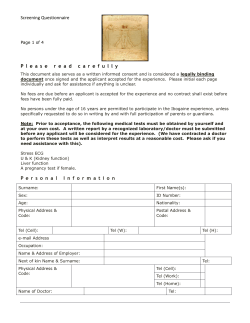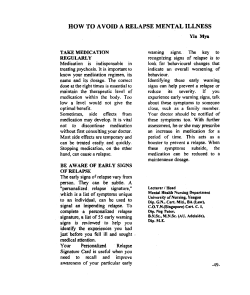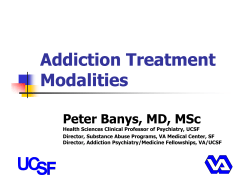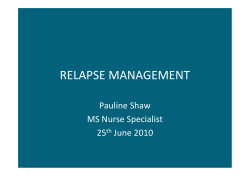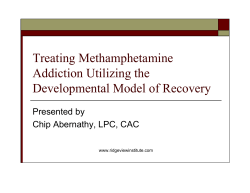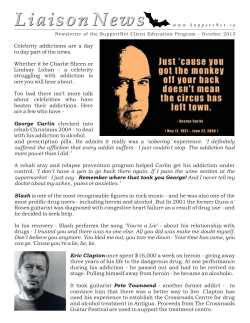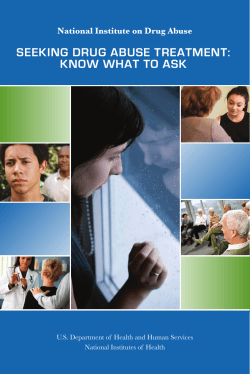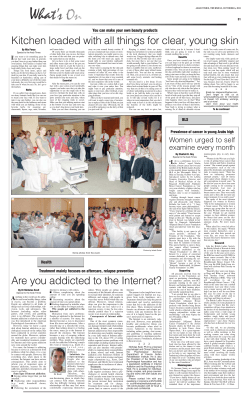
Observational study of the long-term efficacy of ibogaine-assisted treatment in
Observational study of the long-term efficacy of ibogaine-assisted treatment in participants with opiate addiction! Tom Kingsley Brown, PhD (UCSD), Valerie Mojeiko (MAPS), ! Karim Rishi Gargour (CIIS), and Meg Jordan, PhD, RN (CIIS)! ! Sponsored by: MAPS! ! ! Mojeiko -- Ibogaine Can ibogaine treatment facilitate long-term recovery from addiction? Mojeiko -- Ibogaine Outline I. Previous research on ibogaine treatment for substance dependence! II. MAPS research design and current status! III. Preliminary results! IV. A call to collective research efforts ! Evidence for Efficacy A plethora of anecdotal evidence! • 3,414 documented cases of ibogaine-assisted treatment through 2006 (K. Alper, H. Lotsof, and C. Laughlin (2008) J. Ethnopharmacol. 115 (1): 9-24)! ! • Treatments by Lotsof, addict self-help groups in the Netherlands and in New York City, and providers such as Eric Taub (K. Alper, D. Beal, and C. Kaplan (2001) A Contemporary History of Ibogaine in the United States and Europe. The Alkaloids 56: 249-282)! ! Animal studies show that it greatly reduces craving, withdrawal (e.g. S.D. Glick, M.E. Kuehne, J. Raucci (1994) Brain Res. 657: 14-22)! Evidence from clinical studies DPA Conference, Albequerque, NM)! (K. Alper, 2009 ! • Complete resolution of withdrawal symptoms in 29 of 33 subjects (Alper, Lotsof, Fremken, Luciano, and Bastiaans, Am J Addict1999 (8): 234-242) ! • In 27 cocaine- or heroin-addicted patients, “self-reported depression symptoms and craving were significantly decreased” at 1 month after ibogaine treatment (St Kitts study, D. Mash et al., Ann N Y Acad Sci. 2000 (914): 394-401)! ! Lacking good data on long-term efficacy! MAPS Ibogaine Outcomes Study IOA-3! ! Protocol Design and Current Status Primary Objective: …to determine the effectiveness of ibogaine-assisted therapy in producing extended periods of opiate drug-use abstinence, in reducing opiate drug use, and in improving associated impacts of these behaviors as measured by the Addiction Severity Index Lite (ASI-Lite) composite scores over a period of 12 months following therapy. ! Mojeiko--Ibogaine Primary Objective: …to determine the effectiveness of ibogaine-assisted therapy in producing extended periods of opiate drug-use abstinence…! ! (Measure: length of time from treatment until first relapse)! Primary Objective: …in reducing opiate drug use…! ! (Measure and Compare: frequency and dosage of opiate use at baseline and at each monthly follow-up for 12 months)! Primary Objective: …and in improving associated impacts of these behaviors as measured by the Addiction Severity Index Lite (ASI-Lite) composite scores over a period of 12 months following therapy. ASI –Lite Sections! 1. Medical Status! 2. Employment / Support Status! 3. Drug/Alcohol Use! 4. Legal Status! 5. Family/Social Relationships! 6. Psychiatric Status! Secondary Objectives: 1) to investigate: are changes in ASI scores after treatment related to subjective intensity of the experience? (States of Consciousness Questionnaire)! 2) using Subjective Opiate Withdrawal Scale (SOWS), to see if ibogaine treatment reduces withdrawal symptoms! Mojeiko--Ibogaine Secondary Objectives: 3) to determine the effectiveness of ibogaine-assisted therapy in producing extended periods of relief from depression using the Beck Depression Inventory! ! 4) to track changes in Emotional Intelligence (using the Trait Emotional Intelligence Questionnaire, Short Form (TEIQueSF) to observe concomitants of possible relapse into substance use.! Mojeiko--Ibogaine Study Design *Enroll and Follow 30 subjects for one year post-treatment (ASI before treatment + monthly for 12 months after treatment)! ! *Clinics in Baja California, Mexico! ! *Initial (enrollment / baseline) interview in person or video Skype, additional interviews by phone! ! *Inclusion/Exclusion Criteria! ! ! Study Design ! *Secondary measures:! !>SOWS 1x before and 1x after treatment! !>SOCQ and Brief Description after treatment! *Control group of people who come to clinic but are denied treatment for medical reasons! Study Design *Compensation--$10 per monthly “visit” ! ! *Calls with Significant Other (monthly)! *Drug Testing (2x hair (preferred) or 3x urine)! !(subject compensated $55 / $35 per test)! ! Other Secondary Measures: baseline and monthly! *Beck Depression Inventory ! *Test of Emotional Intelligence Questionnaire, Short Form (TEIQuie-SF) ! Current Status! • 30th and final subject enrolled late August, 2011! • Final follow-up call completed last month! • Patient Screening: 67 patients treated during enrollment period (37 did not enroll)! ! • No control group! Patient Screening Data (Number of Patients) Not Eligible-Lacking Contact Information, 1 Not EligibleForeign, 8 Not Eligible-NonOpiate Addiction, 9 Eligible-Enrolled, 30 Not Eligible-Ibogaine Experienced, 4 Not Eligible-Unable/ Unfit to Consent, 4 EligibleTreatment Begun Prior to Enrollment, 9 Eligible-Declined, 4 Preliminary Results! ! • Safety: no adverse events directly related to ibogaine treatment (n=67)! • Several patients (n = 7) treated multiply! • n = 12 subjects declared “Lost to Followup”! • Aftercare: N = 5 (3 residential rehab, 2 halfway house)! Preliminary Results! • ASI scores, secondary measure scores not yet analyzed! • Duration until first relapse (opiates) posttreatment! • Baseline opiate use (frequency) vs. opiate use at 1, 2, and 3 months post-treatment! Mean Opiate Usage Months 0-3 35 30 28.92 25 Days of Use Out of Past Thirty 20 15 Mean 10 6.58 5 5.45 3.20 0 -5 Month 0 Month 1 Month 2 -10 Months Since Treatment Month 3 When First Relapse Occurred 12 10 8 Number of Subjects 6 4 2 0 Within 1st Within 2nd Within 3rd Months to First Relapse Beyond 3rd !> 1/3 relapse within first months !60% relapse within first 2 months !80% relapse within first 6 months ! !> 1/3 relapse within first months !60% relapse within first 2 months !80% relapse within first 6 months ! 20% make it more than 6 months (5 of 6 without any “aftercare” at all)! ! 4 out of 30 (>1/8) “clean” for > 1 year following a single treatment ! Reflections • Confirmation that Ibogaine is an addiction interrupter -- not a cure, not a “magic bullet”! ! • What are the determinants of long-term outcomes?! • The importance of patient’s expectations! ! ! Strengths and Limitations of IOA-3 • Small “n” • Many subjects unreachable month to month ( LTFU) • Some subjects reluctant to talk about relapses • Strictly observational and so not affecting outcomes • Standardly used measures (legitimacy, ease of comparison) • Careful recordkeeping • 1st of its kind New Zealand Ibogaine Study Geoff Noller, PhD! • Ibogaine approved as prescription medicine in NZ (2010)! • Study began early 2012! • Aims to enroll 30 patients! A Call to Collective Research • More data = better! • Why collect data and make it public? 1 Scientific studies can demonstrate efficacy beyond doubt 2 Providers and patients can better assess efficacy and risks and determine best practices based on collective, shared data What to Measure and Track? 1. 2. 3. 1. 2. 3. Minimally Substance use at baseline Dosing schedule (iboga(ine) and other) Previous treatments (iboga and other) Recommended EKG and other physical data related to safety, dosage SOWS, QOL, any aftercare Follow-up measures What Instruments to Use? • Severity of addiction: ASI-Lite or Severity of Dependence Scale (5 items) • SOWS (available for free online) • Beck Depression Inventory (or for free: Zung self-rating Depression Scale, also widely used) • Ferrans and Powers QLI – generic – or WHO Quality of Life (“open-source”) • Self-reported craving scale (PhenX Toolkit) Who’s going to do this? • Who will collect the data? (Clinicians? Interns?) • Who will compile (and analyze) the data from various clinics? • How can it be made available publicly? Global (online) clearinghouse for shared data? Mojeiko--Ibogaine Continuing the Conversation My email: kingsley@ucsd.edu Mojeiko--Ibogaine
© Copyright 2025


